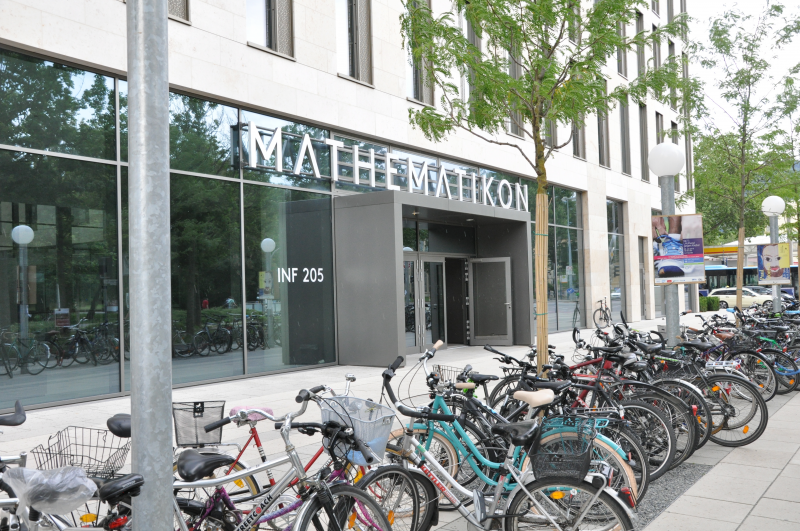
The bachelor's degree in Computer Science (with a subject share of 100%) is usually completed after six semesters. Admission is done through an entrance exam. After successfully completing the bachelor's degree, students are awarded the academic degree Bachelor of Science (B.Sc.) in Computer Science. After that, the studies can be continued with the master's degree, whereby the corresponding admission regulations of the respective master's degree must be observed. Note that the language of instruction is German.
Admission
There is an entrance exam for the bachelor’s degree in Computer Science, which affects both the 100% and 50% subject parts. All information on this can be found in the application process for the bachelor’s degree. Please note the relevant deadlines for the application process. Admission is only possible for the winter semester.
Module handbook (BSc 100%, German only)
Examination regulations (German only)
Application areas in BSc study
Recognition of examination achievements
The bachelor's degree in Computer Science has a modular structure. You will find a list of the modules to be completed in the examination regulations and a detailed description with some information in the module handbook.
| Area | Credit Points |
| Computer Science | 96 |
| Mathematics | 24 |
| Application Area | 24 |
| Cross-skills (ÜK) | 20 |
| Bachelor's thesis + Bachelor's colloquium | 16 |
| Total | 180 |
Compulsory modules. In the fields of Computer Science and Mathematics, there are both modules that must be completed, so-called compulsory modules, and modules in which you have a certain freedom of choice. You have no choice for the following modules (note that these courses are taught in German, thus German module names are listed).
| Area | Module | Credit Points |
| Foundations | ||
| Computer Science | Einführung in die Praktische Informatik | 8 LP |
| Computer Science | Einführung in die Technische Informatik | 8 LP |
| Mathematik | Mathematik für Informatiker 1 oder Lineare Algebra 1 | 8 LP |
| Mathematik | Mathematik für Informatiker 2 oder Analysis 1 | 8 LP |
| Mathematik | Einführung in die Numerik oder Einführung in die Wahrscheinlichkeitstheorie und Statistik oder Analysis 2 | 8 LP |
| further compulsory modules | ||
| Computer Science | Programmierkurs | 4 LP |
| Computer Science | Algorithmen und Datenstrukturen | 8 LP |
| Computer Science | Betriebssysteme und Netzwerke | 8 LP |
| Computer Science | Einführung in die Theoretische Informatik | 8 LP |
| Computer Science | Datenbanken | 8 LP |
| Computer Science | Einführung in Software Engineering | 8 LP |
| Computer Science | Bachelor-Seminar | 4 LP (+2 LP ÜK) |
| Computer Science | Anfängerpraktikum | 2 LP (+4 LP ÜK) |
| Computer Science | Fortgeschrittenenpraktikum | 8 LP |
| Computer Science | Bachelor-Arbeit + Bachelor-Kolloquium | 12 LP + 4 LP |
Elective modules. In addition to the compulsory modules, 22 CP must be completed in the field of Computer Science through elective modules. In the field of Computer Science, this can be done through the elective modules described in the module handbook. It is possible to have up to 16 additional credits from the subject modules of the bachelor’s degree in Mathematics credited. In addition to the compulsory seminar, up to two further bachelor seminars can be chosen. Up to two elective modules (each max. 8 credits) can be chosen from the elective area of the Master's degree in Data and Computer Science (not master's seminar or master's internship!).
Cross-skills (ÜK). You will receive most of the required credit points for ÜK through the seminar (2 credits) and the beginner's internship (4 credits) as well as by successfully completing the application area (6 credits). The remaining 8 CP can be acquired through courses from the university's range of courses that are neither part of the computer science course nor the area of application, or through separate ÜK offers in the field of computer science. The latter are described in the module handbook in the chapter "Compulsory elective area interdisciplinary competences".
Application Areas. In the field of application, 24 CP must be earned. You can find an overview of the subjects currently approved as areas of application here. Helpful comments and descriptions can be found in the Application area chapter of the module handbook.
Parallel studies in Computer Science and Mathematics. Due to the similarity in content and the sometimes large synergy effects, it makes sense to study both the Bachelor of Computer Science and the Bachelor of Mathematics at the same time, so that both courses benefit from it. This is made possible by studying both courses in parallel. There are no additional fees for parallel studies. Interested parties are asked to get in touch with the course advisors or the examination office in order to draw up an individual study plan.
